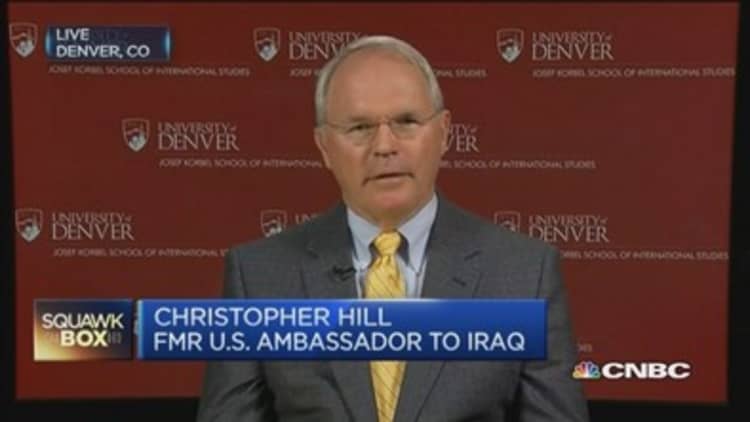While activists work to nail down an international peace walk next month across the heavily militarized corridor that divides the Korean peninsula, event organizers including feminist author Gloria Steinem, might pay closer attention to North Korea's expanding financial web.
That growing ecosystem—including the use of outside commercial banks and fictitious names—allows the ruling elite to move money around the world, and acquire everything from luxury goods to WMD components.
The march is intended to create new pressure to formally end the Korean War that concluded with a cease-fire, and divided the communist north from the democratic south. About 36,000 Americans were killed during the conflict from 1950 to 1953.
But while most North Korean citizens have been isolated from the outside world, leader Kim Jong Un and his ruling elite enjoy international travel privileges and board commercial flights. Collectively they've managed to evade international sanctions and move illicit goods and currency around the world in outposts including financial hubs such as Manhattan.
Now a new report on North Korea makes the case that the rogue state should be put back on a U.S. list of nations that sponsor terrorism, which would have wide-ranging implications, including limiting the regime's ability to move cash around the globe. Today four states are on the list of state sponsors of terrorism: Iran, Syria, Sudan and Cuba. President Barack Obama has said he intends to remove Cuba from the list. (Tweet This)
The report, authored by North Korea expert Joshua Stanton, details the regime's financing of terrorism and intensifying threats against civilian targets, notably North Korean escapees. As outlined in the report and summarized in a presentation Monday night in Washington, D.C., Stanton says North Korea is not only using terrorism as a way to enforce state policy but is increasingly supporting designated terrorist groups including Hezbollah.
They [North Korean individuals, front companies] use fictitious names, they use all kinds of deceptive financial practices. But that's no different than what drug traffickers and terrorists have been using for years.StantonNorth Korea expert
Of course relisting North Korea as a state sponsor of terrorism would highlight its human rights record. A separate, landmark report from the United Nations released last year found wide-ranging human rights violations and accused the regime of "crimes against humanity." The North responded and said its citizens enjoy genuine human rights.
But beyond human rights concerns, the U.N. report and Stanton's research are important because both highlight and potentially implicate North Korea's elite and their financial transactions. China provides North Korea with the "lion's share" of access to outside financial institutions, according to previous congressional testimony and U.N. documents.
Read MoreInside North Korea's international money machine
Relisting North Korea on the terrorism list in part would help close the loopholes among existing international sanctions and ultimately make it more difficult for the ruling elite to move money and conduct illicit business. "The whole objective of sanctions—and something that the Treasury Department has gotten very good at, by the way—was to focus the impact of sanctions on the ruling class and to avoid collateral consequences against the population," said Stanton. The U.S. attorney previously served as U.S. Army judge advocate in South Korea.
The North's sponsorship of terrorism involves threats to freedom of expression in America. Sony Pictures Entertainment, a unit of parent Sony, canceled the Christmas Day release of "The Interview" amid threats of a widespread attack from hackers, who U.S. intelligence officials said were working for North Korea
Read More Inside North Korea's scrappy cyberstrategy
North Korea was removed from the U.S. state sponsor of terrorism list in 2008 amid tense nuclear negotiations under President George W. Bush. But since then, the North has been busy growing its roster of terrorist clients—and related earnings. Citing a former Congressional Research Service member, Pyongyang earns between $1.5 billion and $2 billion annually from its dealing with Iran, including arms sales to Iranian-backed terrorists, as noted in Stanton's research.
His findings complement a U.N. report last year that outlined North Korea's global, financial environment. The North is "experienced in using foreign-based individuals, front companies and shell companies and joint ventures engaged in legitimate business to mask illicit activities associated with sourcing nuclear, ballistic missile and other weapons of mass destruction" programs, according to the March 2014 report.

"The challenge, of course, is always to identify who the people are," Stanton said. "They use fictitious names, they use all kinds of deceptive financial practices. But that's no different than what drug traffickers and terrorists have been using for years."
"With respect to a country like North Korea, where U.S. financial sanctions are weak, listing it as a state sponsor of terrorism would trigger additional sanctions and close a big loophole," Stanton said. The U.S. Treasury Department sanctions individual terrorists and terrorist groups. Separately, the U.S. State Department maintains a list of designated foreign terrorist organizations.
Other North Korea experts note Stanton's research is unique in that it recommends congressional action, including clarifying the definition of "international terrorism," all with no need for dialogue or cooperation from Pyongyang.
"There are things we [the U.S.] can do on our own, and we should," said Marcus Noland, executive vice president and director of studies at the Peterson Institute for International Economics in Washington.
The haves and have-nots
North Korea, meanwhile, remains a nation of two distinct classes. "North Korea's economy is very bifurcated. You have 'haves' and you have 'have-nots,' " Stanton said. "For the most part, the 'have-nots' don't have access to the international financial system."
Average North Koreans are scraping by with state rations and pockets of private enterprise when possible. "The North Korean people are largely feeding themselves by either smuggling or private farming," Stanton said. "We would do more to help those people by opening the borders by sanctioning the border guards, the military and the security forces."


